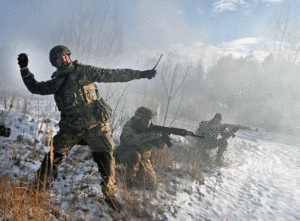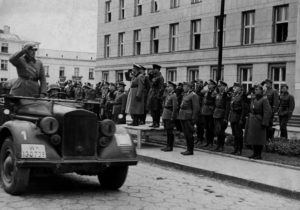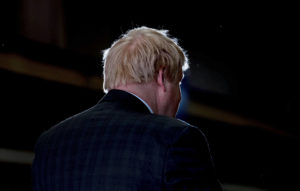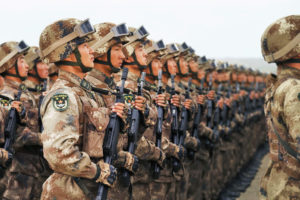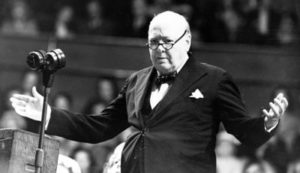If you set off from Kiev and drive east, heading across the flat fields of central Ukraine, after about four hours you’ll come to a city called Poltava. By post-Soviet standards it’s not such a bad place, with a sleepy, tree-lined city centre and some handsome neo-classical buildings, ringed by the usual drab tower blocks. If you passed through it on holiday, you might stop for lunch and then forget all about it.
But for the people of Russia and Ukraine, Poltava is a place of legend. For it was here, on 8 July 1709, that the armies of the Swedish and Russian Empires clashed in the climactic battle of the Great Northern War.
“Soldiers! The hour has struck when the fate of the whole motherland lies in your hands! Either Russia will perish or she will be reborn!” So ran the proclamation of Peter the Great, Tsar of All the Russias, the day before the decisive showdown. For almost a decade he had led a coalition against the Swedish Empire of his rival Charles XII. This was his chance to overturn the balance of power in the Baltic and confirm Russia’s emergence as the new colossus of Northern Europe.
The fighting started before dawn, and for a time the result hung in the balance. Three times Peter was hit by Swedish fire: one musket ball knocked off his hat, another lodged in his saddle, a third was deflected by a silver icon he wore around his neck. But by lunchtime it was all over. Perhaps 10,000 Swedish troops had been killed or wounded, Charles was in flight and the Scandinavians’ power had been broken forever.
“In a single morning,” writes Peter’s biographer Robert K. Massie, the battle had “permanently shifted the political axis of Europe … Poltava was the first thunderous announcement to the world that a new Russia was being born.”
There’s a grim geopolitical symmetry in the fact that today Poltava stands directly in the path of Vladimir Putin’s potential invasion of Ukraine. (It’s closer to the Russian border than it is to Kiev, and just two hours from Ukraine’s second city of Kharkiv, a probable early target for the Russian army.) For the battle at Poltava wasn’t just a foundational moment in Russia’s ascent to empire. It was a colossal moment in Ukrainian history, too.
Since the mid-seventeenth century, the Cossacks of the Zaporizhian Host, in what is now central Ukraine, had been vassals of their Russian neighbours to the north. But only months before the clash at Poltava, the Cossack leader Ivan Mazepa had decided to switch sides, abandoning Peter and throwing in his lot with the Swedes. He was fighting, he said, “for the common good of our mother, my fatherland, poor Ukraine”. His gamble backfired horribly, though. Defeat at Poltava destroyed his dream of Cossack independence and shattered his health; he fled across the border into Ottoman Moldavia and died that autumn.
In the years that followed, with central and eastern Ukraine becoming part of the Russian Empire, Mazepa was cast as an anti-Russian traitor. Every year, on the first Sunday of Lent, he was ritually cursed in Orthodox churches. Even in the Soviet Union he was condemned as a “Ukrainian bourgeois nationalist”. But now many Ukrainians see him as a national hero. Just six years ago the last president, Petro Poroshenko, unveiled a statue of Mazepa in the centre of Poltava. Today his face adorns Ukraine’s 10 hryvnia note.
Fixated on their own modernity, obsessed with the here and now, many Western politicians seem unable to grasp that at the eastern edge of Europe, history really matters. Go to Putin’s official government website, and you can read his 5,000-word essay, “On the Historical Unity of Russians and Ukrainians”, published last summer. Did he really write it himself? It hardly matters. The important thing is that he clearly believes it.
Russians, Ukrainians and Belarusians, Putin says, are one people, “descendants of Ancient Rus”. He admits that they later became fragmented, but insists that “Moscow became the centre of reunification, continuing the tradition of ancient Russian statehood”. The idea of the “Ukrainian people as a nation separate from the Russians”, he says, has “no historical basis”. And as evidence, he points to the Great Northern War. “Only a small portion of the Cossacks supported Mazepa’s rebellion,” Putin insists. “People of all orders and degrees considered themselves Russian and Orthodox.”
There’s plenty to disagree with in Putin’s essay. Britain’s Defence Secretary, Ben Wallace, has even published a long historical rebuttal of his own, pointing out that “Ukraine has been separate from Russia for far longer in its history than it was ever united”. But the revealing thing is that the Kremlin’s top man bothered publishing it at all.
Analysts have spilled oceans of ink speculating about the motives of this most elusive of world leaders. An opportunistic gambler or a supreme strategist? A nationalist or an imperialist? A moderniser or a reactionary? But it’s surely when you see Putin as a historian — that is to say, as somebody shaped by and aware of Russia’s long history, and conscious of his own role as an actor in a vast historical drama — that you see him most clearly.
Today it’s very common to regard Putin as a kind of anomaly. We think of the Western-dominated, rules-based international system as the norm. The West represents order, and Putin represents disorder. We stand for continuity; he represents change and chaos.
But as unpalatable as it might be to admit it, a very long view suggests that it’s Putin who looks normal, and we who look peculiar. After all, if you walk around most European cities you can see plenty of statues of people who were very like Vladimir Putin — pragmatic, ruthless, authoritarian rulers who governed with an iron hand at home and believed might made right abroad. The emperors who sat in Rome, Constantinople or indeed St Petersburg, the kings and commanders who shaped so much European history, would have scoffed at our belief in progress, our disapproval of violence, our idealistic faith in human nature and disdain for our own ancestors.
To take an obvious example, Peter the Great, often seen in the West as a beacon of enlightened leadership, ruled with a savagery that would horrify us today. When the Streltsy army units mutinied in Moscow in 1698, he had some of them whipped to death, others stretched until their limbs snapped, still others roasted alive or torn apart with red-hot pincers. The victor of Poltava fought war after war after war, against the Swedes, the Poles, the Turks, the Kazakhs, the Persians. And it worked. He won. When Peter died in 1725, he ruled the strongest, richest, largest and most stable regime the Russian people had ever known.
In a way, you can tell the story of the last four centuries as an attempt to cope with Peter’s legacy. In the West we’ve become accustomed to seeing Germany as the great “problem” of European history, to quote A. J. P. Taylor. But for most of the last 400 years, it was Russia that was the real problem. It was Russia, not France or Germany, that haunted the nightmares of Victorian Britain’s politicians and generals — Russia, expanding every year into Central Asia, coming ever closer to India, too dynamic to hold back, too big to hold down. It was fear of Russia, the fastest industrialising country in the world, building factories and railways at a breakneck pace, that pushed Germany into the First World War. Fear of Russia lay at the heart of Nazism; it was fear of Russia, too, that persuaded Harry Truman and Clement Attlee to set up NATO and commit so many American and British troops to the defence of Europe.
You can, of course, see the Russian threat to Ukraine in a moral light. The embattled underdog and the overbearing bully; the youthful, stumbling democracy and the cold, ruthless autocrat — it’s not just a good story, it contains a considerable element of truth. But one reason the West’s response has been so pitifully weak is that we refuse to see the world clearly.
Nations have competing interests; we can’t all be friends, and it’s sheer naivety to pretend otherwise. We didn’t “lose” Russia in the Nineties, because Russia was never ours to win. The Russians are an intensely proud and patriotic people, with their own ambitions. They were never going to join NATO any more than they were ever going to line up to become meek, dutiful members of the democratic West.
And although Vladimir Putin is undoubtedly haunted by memories of what happened in the dying days of the Cold War, it’s too crude to see him simply as a Soviet revivalist. As repressive and autocratic as he is, he’s the product of centuries of history. And when he denies that Ukraine is really a country — as he infamously told George W. Bush in 2008 — the plain fact is that millions of Russians agree with him.
None of this, by the way, means we should abandon Ukraine. Quite the reverse. But perhaps it might make us think a bit more carefully about the kind of world we live in — competitive, dangerous, potentially very violent — and the kind of people we choose to lead us through it. For whatever we might have told ourselves after 1989, history didn’t end with the fall of the Berlin Wall. We still live in a world of great powers, competing interests, gnawing anxieties and strategic ambitions. Perhaps above all, we still live in a world of war.
In polite society, people frown awkwardly when you point that out; but as the historian Margaret MacMillan observed in 2018, “war is an integral part of human experience”. Peter the Great would have agreed with her, and almost certainly Vladimir Putin does too. After all, he established himself in power with Russia’s crushing victory in the Second Chechen War (which rather punctures Liz Truss’s ill-judged warning that a Russian attack on Ukraine would be a new Chechnya, since the Russians see that second war as a triumph). Faced with a Georgian bid to join NATO in 2008, he sent in his tanks and won that war too. Then, six years later, his “little green men” went into Crimea. Another war. Another victory. And all the time we in the West stayed at home, and congratulated ourselves on our principles.
So the pages of history turn. Putin’s tanks stream towards the Ukrainian border. In the Kremlin, their canny, cynical, supremely unsentimental master weighs up the odds. If he gets it wrong, he risks humiliation in the eyes of his people. If he gets it right, he has a chance of rebuilding the empire of the Tsars, splintering the Western alliance and leaving Russia in a stronger strategic position than at any time, arguably, since 1945.
He mulls over his options. He reads that the Germans have offered to send the Ukrainians 5,000 helmets, that the British Prime Minister may be toppled by a birthday cake, that the US President wouldn’t be too upset about a “minor incursion” into Ukrainian territory. Then he makes up his mind.
What does he do? Well, ask yourself this: against that background, faced with such opposition, what would you do?
Disclaimer
Some of the posts we share are controversial and we do not necessarily agree with them in the whole extend. Sometimes we agree with the content or part of it but we do not agree with the narration or language. Nevertheless we find them somehow interesting, valuable and/or informative or we share them, because we strongly believe in freedom of speech, free press and journalism. We strongly encourage you to have a critical approach to all the content, do your own research and analysis to build your own opinion.
We would be glad to have your feedback.
Source: UnHerd Read the original article here: https://unherd.com

